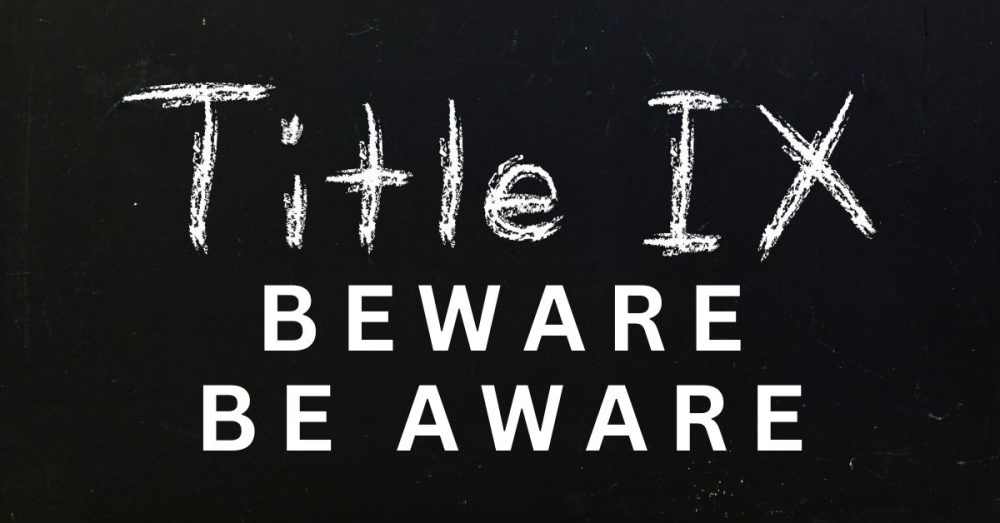A local activist is on an urgent mission to inform North Texas school boards about the potentially disastrous consequences of Biden’s latest Title IX revisions, emphasizing the need for immediate action.
Shannon Ayres, education division lead for the Collin County chapter of Citizens Defending Freedom, has been attending school board meetings to inform district stakeholders about the new Title IX rule, which bans discrimination based on sexual orientation and gender identity, and its potentially grave impact on students and teachers.
Ayres has not been alone in her quest.
“The U.S. Department of Education (USDE) published new Title IX regulations that take effect on August 1, 2024. On April 29, Governor Abbott issued a letter indicating that the State of Texas would not comply with the USDE’s effort to rewrite Title IX. Additionally, Attorney General Paxton has filed suit in federal district court, seeking to postpone, hold unlawful, and set aside the new regulations. More than half of the states have filed similar suits opposing the USDE’s proposed Title IX rule,” the Texas Education Agency posted on its website.
So, what exactly is the rewrite of Title IX that has people concerned?
In part, the Office of Civil Rights, Department of Education’s rule notes that “amendments are required to fully effectuate Title IX’s sex discrimination prohibition. … The Department therefore issues these final regulations to provide greater clarity regarding: the definition of ‘sex-based harassment’; the scope of sex discrimination, including recipients’ obligations not to discriminate based on sex stereotypes, sex characteristics, pregnancy or related conditions, sexual orientation, and gender identity; and recipients’ obligations to provide an educational environment free from discrimination on the basis of sex,” per the published document in the Federal Register.
With all the words used in the nearly 430-page document published by the U.S. Department of Education, many are unclear about what this new rule could mean for schools.
“If you don’t understand what the changes will bring, basically, it brings a lot,” Ayres told The Dallas Express. “For example … it will force schools to put boys in girls’ bathrooms if a boy thinks he is a girl and wants to go to a girl’s bathroom. Any school taking taxpayer money will be forced to put a boy who thinks he is a girl on a girls’ sports team. … It will force teachers to call a child by their preferred pronoun.”
Ayres has been telling parents and school boards that the Biden administration “unilaterally and unconstitutionally enacted this new rule.” She claims it will “erode student privacy by permitting biological males to undress in otherwise sex-separated intimate facilities reserved for biological females.”
She argued that the administration’s actions “completely negate the original intent of Title IX,” which was to “protect [girls] and allow them opportunities that they didn’t have before.”
“Fortunately, Gov. Abbott and Attorney General Paxton and the Texas House of Representatives agree; the question is, do each of you?” Ayres asks school board members.
Ayres has already spoken at school board meetings in Allen, Anna, Lovejoy, Prosper, Melissa, and Princeton, with Plano, Celina, and McKinney still to go, requesting their respective districts sign a “resolution of disapproval” so that “everyone in Collin County has a united front that says we will not comply,” she said.
As reported by The Dallas Express, other DFW school districts, such as Carroll ISD and Keller ISD, have also joined in the fight against the new Title IX rule, passing their own resolutions in opposition.
Proponents of the Title IX revision seem to be keeping their comments quite general, steering clear of delving into the potential implications of allowing biological females and males who identify as transgender into traditionally sex-segregated private spaces like restrooms and in sports.
“With these new rules, the Biden administration has sent a message that an education free from discrimination remains as vital now as it was when Title IX was first enacted over 50 years ago,” stated Randi Weingarten, president of the American Federation of Teachers, in support of the rule change.
Such messaging was echoed by federal officials as well.
“These final regulations clarify Title IX’s requirement that schools promptly and effectively address all forms of sex discrimination,” stated Assistant Secretary for Civil Rights Catherine E. Lhamon. “We look forward to working with schools, students, and families to prevent and eliminate sex discrimination.”
The new rule is slated to go into effect in August. However, lawsuits brought forth by various states have already secured victories in a legal landscape that does not necessarily just rubber-stamp left-wing initiatives.
In fact, a recent ruling by the Supreme Court that mitigates the degree to which deference should be shown to federal agencies and bureaucrats opens the door to even more legal challenges.
“Even without the Supreme Court decisions in Loper Bright and relentless, over-reaching regulations like President Biden’s Title IX rule have faced intensive scrutiny from the courts, with three federal courts issuing preliminary injunctions against the Title IX rule in the last several weeks,” Defense of Freedom Institute president and co-founder Bob Eitel said in an interview with The Center Square.
“With the reversal of Chevron, when faced with ambiguous language in a statute, judges may now use their independent judgment to interpret a law without deferring to the Education Department’s regulators. Rulemaking just got a lot more challenging for the federal bureaucrats in the department looking to push the statutory envelope on Title IX,” he said.


